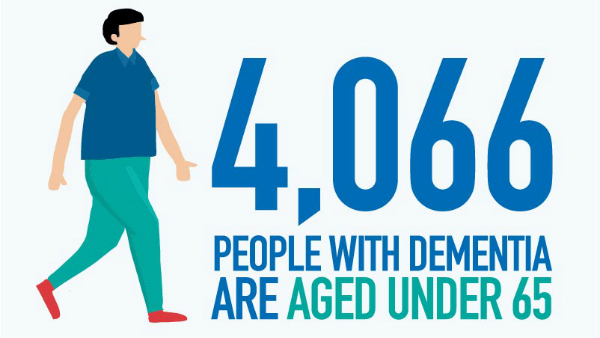Young Onset Dementia
Dementia which occurs under the age of 65 is often referred to as young onset or early onset dementia. There are approximately 4,000 people in Ireland with early onset dementia.
Developing dementia at an early age means you may need to consider things like employment and the impact on young children. You and your family are not alone. You can get support to help you to take the steps you need to take to live well with dementia and plan for the future.

About early onset dementia
There is a wider range of diseases that cause early-onset dementia and a younger person is much more likely to have a rarer form of dementia. Alzheimer’s disease is the most common form of early onset dementia. Other forms are vascular dementia, frontal-temporal dementia, Lewy bodies dementia and Korsakoff’s syndrome, which is alcohol related dementia.
People with other conditions, such as Parkinson’s disease, multiple sclerosis, Huntington’s disease or HIV and AIDS, may also develop early onset dementia as part of their illness. Also, people with Down’s syndrome and other learning disabilities can develop dementia at an early age.
Younger people with dementia experience a range of challenges, which are often different to those that older people face. Younger people are less likely to experience memory loss as one of their early symptoms and may experience changes in behaviour, vision or language first.
There are many things you can do day to day to help you live as well as possible. Click here to read more about practical steps you can take each day. It’s important to continue doing things you enjoy. Try to keep things as normal as possible, making changes when you need to. It can help to make the most of every day.
Genetics and young onset dementia
Families affected by early onset dementia may worry that it can be inherited. It is important to point out that not all cases of early onset dementia are thought to be inherited.
One rare form of dementia that can be passed from generation to generation is called Familial Alzheimer’s. This form of dementia can affect people in their 30’s and 40’s. Where Familial Alzheimer’s is present, there is a 50% possibility of passing on the gene to the next generation who would then eventually develop the condition. Some forms of frontal-temporal dementia or Picks condition have a strong family history and in some cases a genetic link has been found. Again, these inherited types of dementia are rare.
Genetic counselling
If you have a family history of these rare types of dementia you can talk to your doctor about genetic counselling and if it is appropriate for your family. Genetic counselling is a process which will help to determine if your family history suggests genetic testing is an option to be considered.
Employment Rights
Dementia is a disability, which means that people with dementia are protected by Irish Equality Law from some kinds of discrimination, in employment and in buying goods and using everyday services.
There are nine categories named in equality law. These are called “the nine grounds”. Disability is one of the nine grounds. Dementia falls within the definition of disability, which means that people with dementia are covered by the equality legislation, if they experience discrimination related to having dementia.
People with dementia in employment are also entitled to “appropriate measures” to help them carry out their work. This is a very important concept in equality law (in the Equal Status Act it is called “reasonable accommodation” and can be very useful in relation to employment.
The obligation to take “appropriate measures” means that if you have difficulty carrying out your work because of your disability, the employer must put in place supports or special facilities to help you. For example, in employment, this could include allowing flexible working hours or providing peer support from other colleagues.
There are limits on what employers have to do. The law says that taking appropriate measures cannot place a “disproportionate burden” on an employer. A big employer with more resources is expected to do more than a small employer with fewer sources.
You are not obliged under Equality Law to disclose to your employer that you have dementia, however, if you do not do so, it will be impossible for them to explore whether they can make “reasonable accommodation.”
You cannot be dismissed from employment simply because your employer becomes aware you have dementia. Your employer would need to be able to demonstrate that you are unable to do your job, despite options for reasonable accommodation having been explored.
There is a point at which dementia may impact on a person’s ability to do their job to the extent that reasonable accommodation will not be possible. Also, in some types of work, there may be very little that can be done in the way of reasonable accommodation. Not every situation in which a person is treated differently on the basis of having a disability will constitute discrimination.
If you develop dementia while working, you should look for detailed information and advice on your rights.
For further information:
- Call the Alzheimer National Helpline on 1800 341 341
- Read our resource
- Visit the Irish Human Rights and Equality Commission ’s website
- Read: “Your Employment Equality Rights Explained: A guide to the Employment Equaity Acts 1998-2011”
- Call the Irish Human Rights and Equality Commission on Lo Call01 858 9601
Planning for the future
You may already be dealing with changes you didn’t expect, especially at this age. When you are dealing with your diagnosis of dementia, it may feel like the last thing you want to do. But planning for the future is important.
A diagnosis of dementia at a young age may affect your income and financial commitments. You may be managing your financial affairs well, but it is always good to be prepared for the future. For information on planning for the future click here. You can also read and download ‘I have dementia…How do I plan for the future’.

